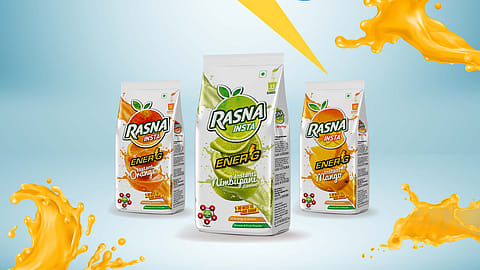Rasna revives Jumpin to enter the ₹1,000-cr RTD race with a sugar-smart twist
By acquiring a fruit drink brand from Hershey’s, Rasna plots a sugar-smart, rural-urban revival strategy with a health-conscious twist.

Rasna Pvt. Ltd, the country’s largest maker of instant beverages, has acquired the iconic mango drink brand, Jumpin, from Hershey’s India, marking its formal entry into the ₹1,000 crore ready-to-drink (RTD) beverage segment.
While the deal value remains undisclosed, independent estimates peg Jumpin’s worth at around ₹350 crore. The acquisition is part of Rasna’s broader ambition to diversify into the fast-growing non-carbonated beverage space.
Originally launched by the Godrej Group and later managed by Hershey’s India, Jumpin was India’s first tetra pack juice drink and a household name until it quietly disappeared during the Covid-19 pandemic. Now under Rasna’s stewardship, the brand is being repositioned for a relaunch in June 2025—with a health-conscious, vitamin-rich formulation aimed at younger consumers.
“We are reducing the sugar content by 50% without compromising on taste,” said Piruz Khambatta, Chairman of Rasna Group, adding that future extensions with proteins and milk-based additives are also on the table.
Khambatta believes Jumpin’s enduring brand equity gives Rasna a strategic edge. “The strong consumer recall makes it a valuable addition to our portfolio,” he said, highlighting potential synergies in product development and distribution. India’s fruit juice market, currently valued at over ₹24,000 crore, is projected to reach ₹1,22,855 crore by 2033, growing at a CAGR of 11.9%, according to IMARC Group.
Notably, Rasna has deliberately chosen not to launch an RTD line under its own name. “A powder drink costs ₹10 and makes three glasses. A bottled version costs ₹20 for just one. Consumers don’t see the value—it’s like paying ₹130 for what feels like a ₹10 coffee,” Khambatta explained. He pointed to past failures by other brands trying to migrate from powder to bottled formats, making a case for acquiring a standalone identity like Jumpin instead.
The revived Jumpin will be launched in a variety of formats: PET bottles in 250 ml, 600 ml, and 1.2 L sizes, and tetra packs in 125 ml, 200 ml, and 1 L options. Flavours include mango, litchi, lemon, and guava.
Distribution will span modern trade, e-commerce platforms, and Rasna’s extensive rural network of 1.6 million outlets. While the brand will enter metros, Khambatta’s strategic focus lies in tier-2 and tier-3 towns. “This country is still divided into hard markets. We’re not ignoring metros, but our stronger push will be in smaller towns where competition is lower,” he said.
International markets are also on the radar. Rasna is considering phased exports of Jumpin, with local production options in key markets such as the US and UK depending on cost and logistics.
Back home, Rasna plans to reclaim Jumpin’s once-dominant presence on Indian Railways. However, airline collaborations are off the table for now. “Indigo had offered me a spot, but I refused unless they’d put our name on the main label,” Khambatta said, calling in-flight tie-ups expensive and unviable. “There’s no money in it—it’s just a marketing gimmick.”